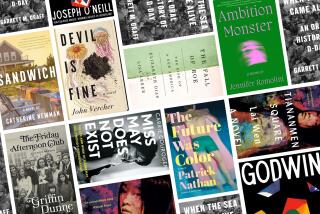NONFICTION - March 29, 1987
GRANTA 20: IN TROUBLE AGAIN: A SPECIAL ISSUE OF TRAVEL WRITING (Penguin: $6.95, paperback). Armchair travelers are in for an eccentric, eclectic tour if they let their guide be Granta 20, the newest issue of the English literary quarterly, edited by Bill Buford.
From the Amazon in Venezuela to Bradford in northern England, from China to Cuba and Czechoslovakia, such stylish writers as Orville Schell and Hanif Kureishi, of “My Beautiful Laundrette” fame, weave a world picture that is personal and subjective as a traveler’s photo album.
It is the quest, of course, that motivates these writers-on-the-road. In China, Schell searches for evidence of cultural liberation and finds it has taken an aberrant form. The country’s unleashed ardor for everything new is overrunning its past standards of beauty.
Schell uses an official government gift to illustrate. It is a fluffy kitten made of spun polyester--a modern if unappealing material for a “sculpture” that reminds him of a taxidermist’s trophy.
Schell is not alone in considering how politics can create blind spots in cultural evolution. In Nanjing, China, Colin Thubron meets three generations of a family all living under the same roof and marvels at one who aspires to be a professional singer. Government standards are such that she has no training or exposure to accomplished musical talent--no means to compare or measure her own progress. Thurbon reflects this image in the woman herself who seems ignorant that she is tone-deaf.
In Prague, Timothy Garton Ash visits writer Vaclav Havel, a hero in the West where his “political” plays are staged while they are banned in his own country. Similar to the aspiring singer in China, Havel’s creative power has dulled, Ash reports, because he never sees his work performed or hears his written words spoken. He has become like a ballerina who practices without a mirror and cannot check her form.
All is not well in Kureishi’s Bradford, either. He shows us neo-Nazism and the National Front in force. But he also finds indicators that the city’s Muslim, Indian and Asian communities are making an imprint on the greater community. His is one of the more hopeful cultural reports in this Granta issue.
Throughout, the magazine represents a challenge to popular American journalistic positions. Martha Gellhorn visits Cuba and reports that, contrary to typical news accounts, many there see Castro as a benign if not benevolent ruler. Salman Rushdie describes a Nicaragua where villagers consider contras, not Sandinistas, to be villains who destroy homes and the property that provides livelihood.
All, however, is not oppressive in this Granta issue. Contributor Redmond O’Hanlon travels for the classic adventurer’s motive--to get there first. He gives a bawdy account of his tour through Venezuela’s Amazon and his arrival at Mt. Neblina, where he claims title as the first European. It is a rowdy comedy fueled by sex, drugs and piranha soup.
While the smartly written contents of Granta 20 are impressive, the presentation has a drawback. Journalist-style photographs that accompany the articles are without captions so that it isn’t always clear who or what they illustrate.
That may be to remind us how British eccentricity can cross the line between absent-mindedness and assumed superiority. Related perhaps are the issue’s touch of straight-faced lunacy at which the British have always excelled. You see it in the magazine’s ads, for example. Back-to-back with one for “Boulevard,” a highbrow journal of contemporary fiction, is an ad for “First Need”--a portable drinking water purifier. Civilized adventurers won’t leave home without one of each.
More to Read
Sign up for our Book Club newsletter
Get the latest news, events and more from the Los Angeles Times Book Club, and help us get L.A. reading and talking.
You may occasionally receive promotional content from the Los Angeles Times.







